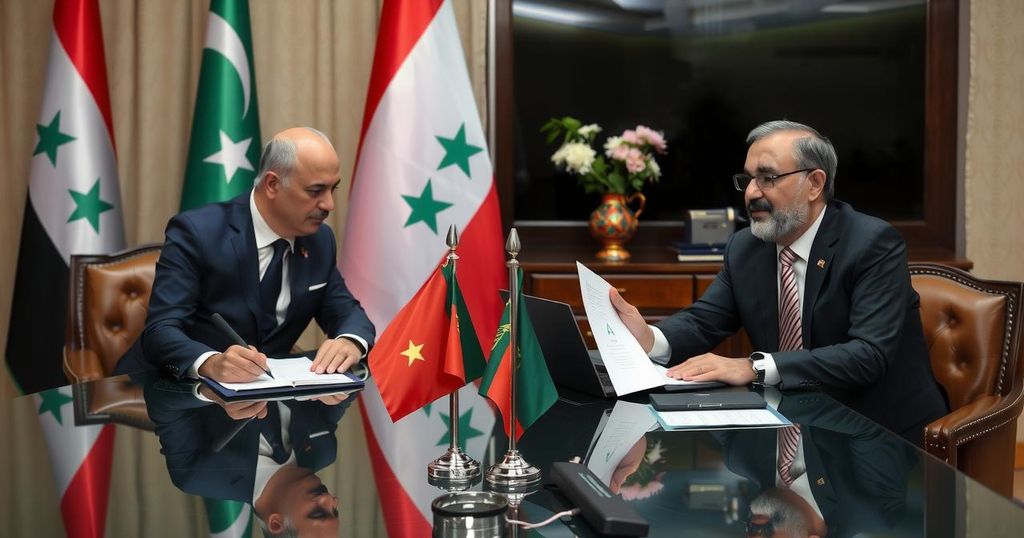A top Libyan official met with Syria’s new leader to discuss improving diplomatic relations, cooperation on energy, military issues, and addressing irregular migration, particularly concerning Syrians fleeing civil war. The reinvigoration of ties between Libya and Syria comes after years of diplomatic absence since the fall of Gaddafi and amid Libya’s ongoing political division.
On Saturday, a senior official from Libya’s UN-recognized government, Minister of State for Communication and Political Affairs Walid Ellafi, convened with Syria’s newly appointed leader Ahmed al-Sharaa in Damascus. Discussions encompassed the enhancement of diplomatic relations, cooperation on energy and migration issues, as well as security and military collaboration. Ellafi affirmed Libya’s support for Syria during this significant transitional phase, highlighting the necessity for increased diplomatic representation between the two nations.
Particularly, both sides acknowledged the challenges of irregular migration, noting the plight of Syrians who have fled civil strife since 2011 and turned to Libya for employment and onward passage to Europe. Furthermore, establishing stronger ties in the energy sector and trade was underscored as crucial. Libya, which has been politically divided, expressed a desire to reinstate formal diplomatic presence in Syria, a relationship that had lapsed since 2012 following the toppling of former dictator Muammar Gaddafi. This diplomatic initiative follows an earlier attempt in March 2020 by representatives of a rival eastern administration led by Khalifa Haftar to re-establish relations with Damascus.
Additionally, on the same day, Syrian state media showcased Sharaa’s meeting with Bahrain’s strategic security chief, Sheikh Ahmed bin Abdulaziz Al-Khalifa, although specifics about their dialogue remain scant. Nevertheless, a Bahraini spokesperson emphasized Bahrain’s commitment to fostering dialogue conducive to Syria’s stability as part of its leadership of the current Arab Summit. Sierra’s new leadership continues to reach out to various envoys globally following its recent consolidation of power following a swift military offensive that led to the ousting of President Bashar al-Assad.
The geopolitical landscape in the Middle East is marked by ongoing conflicts and shifting alliances, particularly concerning Syria and Libya. Since the civil war began in 2011, Syria has faced significant humanitarian crises, leading many to seek refuge in neighboring countries, including Libya. Libya itself experiences political fragmentation, with competing governments vying for control, further complicating diplomatic efforts. The recent meeting between Libya and Syrian officials indicates a potential thaw in relations, with both nations exploring collaborative opportunities as they navigate transitional phases in their governance.
In summary, the meeting between Libyan and Syrian officials underscores a pivotal moment in their diplomatic relations as both sides seek to enhance cooperation amidst socio-political transitions. The dialogue encompassing energy, migration, and military issues reflects a commitment to mutual support and strong bilateral ties. Additionally, this engagement suggests a broader regional trend as various nations re-establish connections with Syria post-conflict. The evolving dynamics indicate a cautious yet hopeful outlook for enhanced stability and collaboration in the region.
Original Source: www.hindustantimes.com






